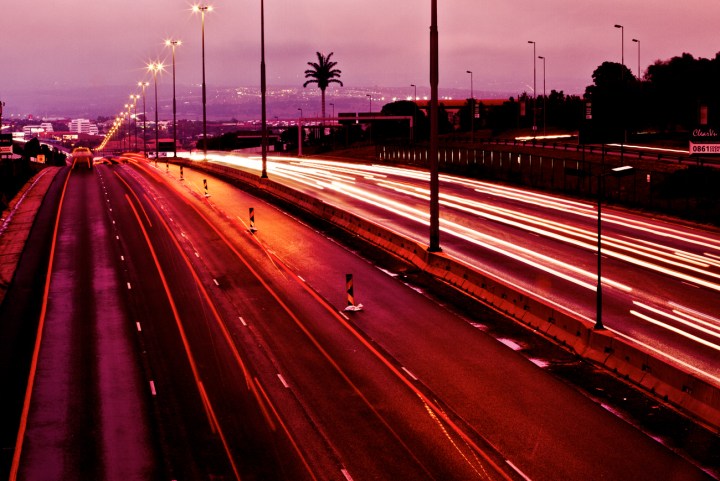Politics, South Africa
E-tolls: Judge’s admission of urgency Outa hurt Sanral

Normally, when law and emotion meet in a courtroom, emotion limps away with a black eye and bruised ego. But yesterday’s urgency ruling during a legal bid to stop Gauteng’s e-tolling spoke volumes about the importance of public resistance and the temperature of its anger. And if all goes well, a decision on whether the interdict will be granted is expected on Thursday. By ALEX ELISEEV.
David Unterhalter was working towards a dramatic finish, trying to convince the court the challenge against e-tolling did not qualify as an urgent matter. He had constructed his argument on the basis that the system had been declared four years ago and that those who sit back and wait until the last moment must suffer the consequences.
Unterhalter told the court that if urgency were granted, the case would prove extraordinary and make legal history.
“It is… quite simply… too… late,” he announced, folding his arms behind his back. Acknowledging the resistance to the project, he went on: “Psychologically it’s understandable, but it has nothing to do with legality.”
After all parties had had their last says, Judge Bill Prinsloo began delivering his ruling on urgency. He took his time, summing up the various arguments.
The anxious tweets began to pop up:
“This anticipation is unbearable”
“Come oooooooooonnnnnn!!! I’m going to crack under the pressure”
“Sitting on the edge of my tweet”
“cmon cmon cmon…..”
“This is worse than a horror movie”
“Holding my breath here”
And on it went until Judge Prinsloo finally announced he would grant the urgency the alliance needed to present its case and have a real shot at stopping e-tolling from being launched on Monday.
The judge ruled that the fate of the project only became clear in February this year. Therefore, he reasoned, the alliance could not have brought the application earlier. He praised the work it had done in preparing its application, saying it acted “with due diligence” and had adopted a “reasonable approach”. He also found that, with the launch just a weekend away, the applicants had shown why the matter was urgent.
But perhaps the most interesting aspect of the ruling lay between the lines, in what Judge Prinsloo did not say. Having agreed with the Opposition to Urban Tolling Alliance that they could not challenge something they did not understand, he issued an indictment on the way the project had been handled since its inception.
OUTA had spoken of numerous postponements, the late release of regulations and terms and conditions, as well as poor public consultation. It claimed it would have acted sooner had the information been available.
So why was there so little clarity on a multibillion-rand project that had been planned over a period of four years? How could it be that tariffs and regulations were still not finalised just weeks away from the system going live? These were some of the questions raised by the judgment.
Another fascinating detail was Judge Prinsloo’s take on the public outcry over the tolls. “It seems to me that the immense and widespread public interest in this matter and the ongoing protest against the planned tolling from many quarters should also persuade me to exercise my discretion in hearing this matter as one of urgency,” he ruled.
This was the “psychology” of the case Unterhalter had referred to earlier. It seems all the campaigns, protests, petitions, bumper stickers and camels on the N1 highway had played their roles in helping the alliance clear a crucial legal hurdle.
Interdicts of this nature live or die on whether urgency is granted, and in this case this was amplified by the imminent launch. Had it gone the other way, the case would have been heard in two, three or four months’ time, with a big question mark over whether once launched, e-tolling could ever be reversed.
Also, should it succeed in obtaining the interdict, the alliance may receive the additional support it will need to fight a long and expensive battle.
Straight after judgment, the court heard an application by AfriForum to join in proceedings by teaming up with Outa. After lengthy arguments – which included the quoting of the theme song from that awful sitcom Married with Children – the application was rejected. Judge Prinsloo ruled, while under normal circumstances a case of this magnitude “needs all the help it can get”, the aspect AfriForum was raising was new and should not be allowed at this stage.
From there, Alistair Franklin, for Outa, kicked off the actual hearing into whether the interdict should be granted. He outlined the various lines of attack, which all set out to prove the e-tolling project was irrational, expensive and unmanageable. “Implementing the tolls will be practically impossible,” Franklin argued.
He spoke about how much money would be recovered through fees versus how much the project cost. By Outa’s estimates, taxpayers will land up paying an extra R70-billion over 20 years.
Franklin also questioned how Sanral would cope with the high rate of non-compliance, asking whether it would be able to run after as many as 70,000 motorists a day who failed to pay for using the roads. He asked how much it would cost to recover the money owed in fees and whether this made any economic sense?
The alleged lack of public consultation is another bone of contention.
When the case resumes on Thursday, Sanral and the treasury will have a chance to respond to these attacks. While they have submitted a lengthy written response, it will be interesting to hear them tell the court how they see the system running at a practical level.
With urgency now in place, the hearing will need to finish before Monday. With Friday a public holiday, the pressure is on. An informal agreement has been made for all sides to move as quickly as possible through their arguments, but expect a long day nevertheless. Judgment could be delivered straight afterwards. If that happens, Freedom Day 2012 will bring unbearable heaviness of tragic irony for millions of South Africans – or signal a celebration of the power of public protest. DM




 Become an Insider
Become an Insider